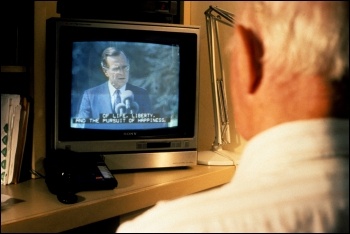Keith Dickinson, West London Socialist Party
The sheer hypocrisy of this Tory government, with candidates fighting like rats in a sack for the leadership, is exposed further by its demand that the BBC rethink its plan to scrap free television licences for over-75s.
The interests of all pensioners are completely secondary to both sides, except as election votes or what little money the capitalist class considers pensioners are entitled to.
The BBC says it will scrap free licences for over three million pensioners from June 2020, with a means test leaving only those on pension credit eligible. Only 1.5 million households of the present 4.45 million will receive the service.
The charity Age UK says: “For over a million of the oldest people in our country, the TV is the constant companion and window on the world. And now it’s under threat.” It estimates that the extra cost could push over 50,000 pensioners below the poverty line, and has handed in a petition of 80,000 signatures to 10 Downing Street.
Caroline Abrahams, the charity’s director, adds: “If this scheme goes ahead, we are going to see sick and disabled people in their 80s and 90s, who are completely dependent on their cherished television for companionship and news, forced to give it up.”
“Means testing may sound fair, but in reality it means at least 650,000 of our poorest pensioners facing a big annual bill they simply can’t afford, because though eligible for pension credit they don’t actually get it.”
The Government says the BBC is responsible for this. Theresa May is “very disappointed.” But it was her government in 2015 that stopped paying for the scheme, and insisted the BBC pay.
The Tories and their ruling-class backers have for a long time considered the BBC a load of ‘lefty liberals’, despite its pro-establishment bias, and wanted all broadcasting to be commercialised. Effectively, huge chunks of the BBC have been privatised, as with the NHS.
Most of the drama productions are now ‘produced for the BBC’ by outsourced companies which make profits from selling them around the world. Hundreds of millions of pounds, which in the past would have filled the BBC’s coffers.
The BBC says it will cost £745 million a year if it can’t collect fees from all those over 75, and only £250 million with the new scheme. Of course, it could recover a couple of million from the huge salaries of some of its senior broadcasters – which Tories constantly exclaim about without mentioning the salaries of their millionaire cabinet and big business backers.
The BBC director-general, Lord Hall, stresses that the government’s licence fee settlement in 2010 left funding 24% lower than if the fee had gone up with inflation.
But he doesn’t point out that many MPs and their capitalist friends are advocating the BBC abolish the fee altogether – effectively abolish the BBC as it presently exists. He says there has been no public consultation or parliamentary scrutiny on the last two government settlements.
And he doesn’t point out that the licence fee is, in effect, a form of regressive taxation. A socialist programme for broadcasting should abolish it for all, with funding guaranteed from other sources such as the taxes we already pay and nationalising the banks.
In the context of austerity and privatisation, the entertainment unions have understandable concerns about abolishing the licence fee because – for now – it is ring-fenced funding for public broadcasting.
But only by booting out the Tories, and replacing austerity and privatisation with socialist nationalisation and democratic workers’ control, can funding be guaranteed.
The BBC is supposed to be a public service. Hall claims “the BBC belongs to all of us. Young and old. Rich and poor.” If so, it should be publicly owned, fully funded and democratically controlled. This should include guaranteeing airtime to alternative viewpoints according to their support in wider society.
The governing body could be made up one-third by the very capable BBC workforce of all departments, one-third from the wider trade union movement, and one-third from a socialist government.
In the meantime, we must fight against this attack on pensioners through our trade unions, residents’ associations, community campaigns and all other bodies of struggle. Insist on full funding from the government and that the BBC stop this proposal!








